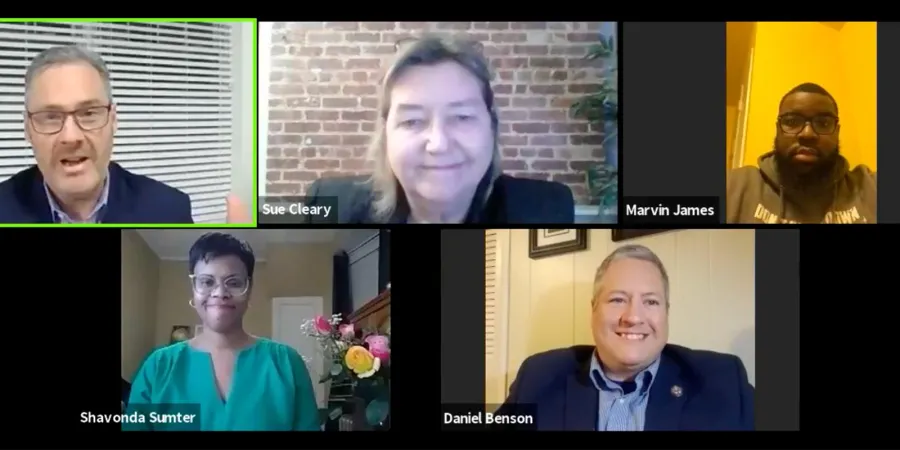Future of New Jersey's Behavioral Health Industry Discussed at Virtual Town Hall

Unorganized workers joined AFSCME members, leaders and legislative allies during a recent virtual town hall to celebrate a critical victory for the United We Heal behavioral health organizing campaign in New Jersey, answer questions and discuss what comes next.
Panelists included Marvin James, a residential counselor at SERV Behavioral Health System in Mercer County; NUHHCE District 1199J President Susan Cleary; AFSCME New Jersey Executive Director Steven Tully; and two legislators, Assemblywoman Shavonda Sumter and Assemblyman Dan Benson.
“What is clear is that change is needed in the behavioral health industry in New Jersey,” said Tully. “But change is not going to happen unless we, together, make it happen. AFSCME is the union for behavioral health providers in New Jersey because we know that you cannot fix the behavioral health crisis in this state without the workers.”
United We Heal-backed legislation that New Jersey Gov. Phil Murphy signed into law last month requires the state to sign agreements that are fair to workers when awarding contracts for behavioral health and substance abuse services. This ensures workers who want to form unions can do so without fear of harassment and intimidation.
The new law will help workers avoid the type of anti-union campaign that James and his co-workers confronted. SERV brought in an anti-union law firm to help conduct mandatory group and one-on-one meetings during which the Mercer County-based staff endured threats, intimidations, lies, false promises, begging and other tricks aimed at silencing their voices.
“They made promises before the pandemic and they stuck to none of them as things progressed. They haven’t done anything to make you not want to unionize,” James said.
Town hall participants were asked to support AFSCME’s vision for the behavioral health industry. Our union’s vision includes a number of worker-friendly steps, such as providing access to rapid COVID tests and personal protective equipment, creating a starting pay rate of $18/hour for qualified provider positions, and establishing a career promotion path to reduce staff turnover.
This vision can be achieved through strong union contracts that will raise standards across the industry, said Cleary.
“The most important thing whenever you get a first contract is that you have guaranteed things in writing that cannot be taken away,” she said.
For Sumter, the assemblywoman with 20 years of experience in the behavioral health industry, strengthening the union rights of caregivers “was a no-brainer.”
She knows the lengths that workers go to in order to provide quality and competent care for their clients, too often doing so without all the tools necessary.
“What happens in behavioral health, and I’m guilty of it, is we make a way out of ‘no way.’ If they say we can’t do it, we are going to figure it out because it is the right thing to do for the right reasons,” Sumter said.
Benson, a caretaker of a patient with behavioral health needs, said personal stories from front-line staff describing the attacks they faced when trying to organize their union “really put the fire where it needed to be to make sure we got that bill done.”
He reiterated that a union contract allows workers to speak up about safety issues not just for themselves, but for their clients as well.
Now, more than ever, we see how critically important these essential workers, and the services they provide, are to our communities. That is why this vision is so important – it will deliver a stronger and more resilient social services network in the Garden State and serve as a national model.
(Contributing: Meredith Scalos)
